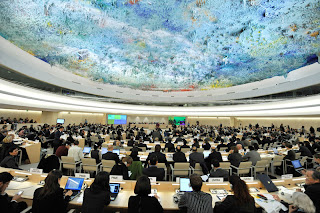 |
| The main chambers of the United Nations Human Rights Council |
We’ve all been there: you’re immersed in
another culture—either physically or conversationally—and you find yourself
putting more thought into your words than usual. You don’t want to offend
anyone, and you hope no one says anything that you yourself would find
offensive. For the most part, this kind of cross-cultural communication can serve to build mutual understanding and trust, but oftentimes there’s that awkward
feeling of self-censorship we impose because of who’s in our
company. As awkward as that may feel, it’s a good kind of awkward, one that
makes you more reflective about word choice, mannerisms and idiosyncrasies that
might put off others who grew up with vastly different cultural practices and guided by diverse value systems. Feel free to break free from the social and cultural norms, or to
utter a phrase you know your counterpart will revile, but don’t be surprised if you get more than a few dirty looks.